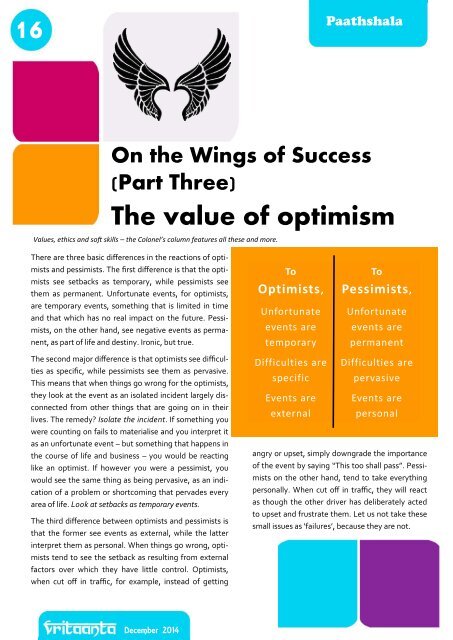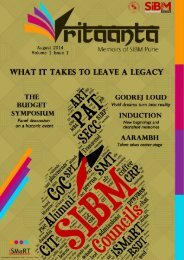Vritaanta December 2014
The Monthly Magazine of SIBM Pune
The Monthly Magazine of SIBM Pune
You also want an ePaper? Increase the reach of your titles
YUMPU automatically turns print PDFs into web optimized ePapers that Google loves.
16<br />
Paathshala<br />
On the Wings of Success<br />
(Part Three)<br />
The value of optimism<br />
Values, ethics and soft skills – the Colonel’s column features all these and more.<br />
There are three basic differences in the reactions of optimists<br />
and pessimists. The first difference is that the optimists<br />
see setbacks as temporary, while pessimists see<br />
them as permanent. Unfortunate events, for optimists,<br />
are temporary events, something that is limited in time<br />
and that which has no real impact on the future. Pessimists,<br />
on the other hand, see negative events as permanent,<br />
as part of life and destiny. Ironic, but true.<br />
To<br />
Optimists,<br />
Unfortunate<br />
events are<br />
temporary<br />
To<br />
Pessimists,<br />
Unfortunate<br />
events are<br />
permanent<br />
The second major difference is that optimists see difficulties<br />
as specific, while pessimists see them as pervasive.<br />
This means that when things go wrong for the optimists,<br />
they look at the event as an isolated incident largely disconnected<br />
from other things that are going on in their<br />
lives. The remedy? Isolate the incident. If something you<br />
were counting on fails to materialise and you interpret it<br />
as an unfortunate event – but something that happens in<br />
the course of life and business – you would be reacting<br />
like an optimist. If however you were a pessimist, you<br />
would see the same thing as being pervasive, as an indication<br />
of a problem or shortcoming that pervades every<br />
area of life. Look at setbacks as temporary events.<br />
The third difference between optimists and pessimists is<br />
that the former see events as external, while the latter<br />
interpret them as personal. When things go wrong, optimists<br />
tend to see the setback as resulting from external<br />
factors over which they have little control. Optimists,<br />
when cut off in traffic, for example, instead of getting<br />
Difficulties are<br />
specific<br />
Events are<br />
external<br />
Difficulties are<br />
pervasive<br />
Events are<br />
personal<br />
angry or upset, simply downgrade the importance<br />
of the event by saying “This too shall pass”. Pessimists<br />
on the other hand, tend to take everything<br />
personally. When cut off in traffic, they will react<br />
as though the other driver has deliberately acted<br />
to upset and frustrate them. Let us not take these<br />
small issues as ‘failures’, because they are not.<br />
<strong>December</strong> <strong>2014</strong>






